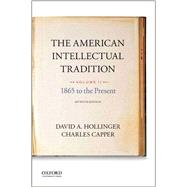Revised and updated, the seventh edition of this now standard two-volume anthology brings together some of the most historically significant writings in American intellectual history. Uniquely comprehensive, The American Intellectual Tradition includes classic works in philosophy, religion, social theory, political thought, economics, psychology, and cultural and literary criticism. Organized chronologically into thematic sections, the two volumes trace the evolution of American intellectual writing and thinking from its origins in Puritan beliefs to the most recent essays on diversity and postmodernity.
New to This Edition
* New selections reflecting recent developments in historical scholarship
* New selections by Samuel Stanhope Smith, Bronson Alcott, Francis Lieber, and others reflecting the increase in scholarly work on early racial science, educational theory, and American nationalism
* New selections on recent public debates about American "exceptionalism," religion, globalization, race, science, and technology, including Philip Kitcher on atheism, Norbert Wiener on cybernetics, and Francis Fukayama on the geopolitical dynamics of the late twentieth century








